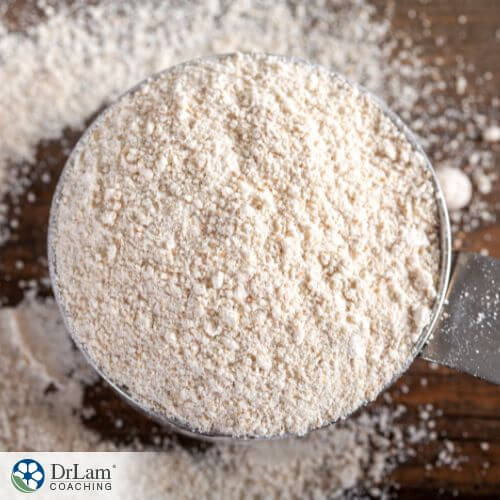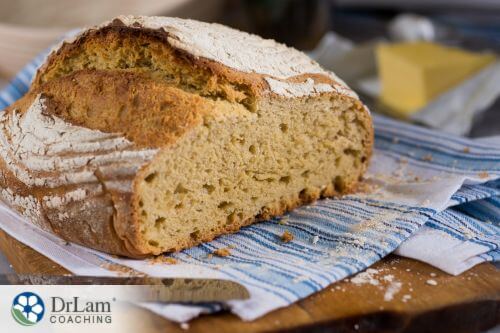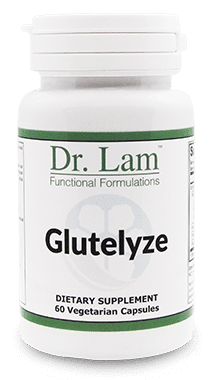Despite the increasing interest in trying different types of flour and heritage grains in recent years, one of the oldest of these types often doesn't get much attention: einkorn flour. Here we explore this flour and the benefits that it may provide to your health.
 The word einkorn is a German word that, when translated, means single grain. This type of wheat is one of the first types domesticated and is considered the original wheat. The use of einkorn dates back to at least 5,000 years ago in the Middle East. Today, this grain is grown in many different parts of the world including:
The word einkorn is a German word that, when translated, means single grain. This type of wheat is one of the first types domesticated and is considered the original wheat. The use of einkorn dates back to at least 5,000 years ago in the Middle East. Today, this grain is grown in many different parts of the world including:
Einkorn is similar to emmer and spelt grains and consists of grain berries surrounded by a thick husk. This protects the grain and allows it to be grown in areas with harsh climates.
Einkorn flour is not always available at your typical grocery store, but you can buy it online.
Modern types of wheat have been designed for rapid growth and have been processed through genetic modification and hybridization. This makes them more refined compared to einkorn wheat, which is higher in fiber. Generally, modern grains are lower in nutrients and higher in gluten and phytates - an antinutrient that can inhibit the absorption of calcium.
Genetically, these two grains are also different. Einkorn contains 14 chromosomes, whereas modern wheat contains 42 chromosomes. Because einkorn has fewer chromosomes, its gluten structure is weaker, making it easier to digest. Some individuals with gluten sensitivity may be able to consume this type of grain because of this difference.
Einkorn flour is rich in beneficial compounds like lutein and beta-carotene. These plant pigments may be protective of the eye as they can help to absorb damaging light that enters the eye.
There are different types of einkorn flour that are available such as all-purpose einkorn flour as well as sprouted einkorn flour. Sprouted flour is when the grains are harvested just before they sprout. To encourage this process, the grains are soaked in water and then exposed to heat and warmth. Studies suggest that sprouting can increase the number of carotenoids in the grain (1). Carotenoids have multiple benefits, especially in eye health. Some health benefits include reducing the occurrence of macular degeneration and reducing some cancers. Carotenoids are also antioxidants. Antioxidants help to neutralize unstable molecules called free radicals that your body produces in response to stress, pollutants such as harmful UV rays, and illness. Carotenoids can therefore help reduce cellular damage and inflammation.
Maintaining a healthy weight is an important part of health and wellness. Einkorn flour benefits your weight in many different ways. One of the ways is that it contains less gluten and can be digested more easily by your body. This allows your body to absorb nutrients more easily and can assist in weight maintenance.
Einkorn flour is also more nutritious than modern grains. It's rich in protein as well as minerals such as zinc and iron. Especially sprouted einkorn flour is also high in fiber, which can help to improve gut health and assist with feelings of fullness.
 Compared to modern grains, ancient grains including einkorn release glucose more slowly. This helps to control glucose levels which helps balance blood sugar levels and may assist in the delay of diabetes.
Compared to modern grains, ancient grains including einkorn release glucose more slowly. This helps to control glucose levels which helps balance blood sugar levels and may assist in the delay of diabetes.
One study found that ancient grains including einkorn can decrease the production of cells that are responsible for glucose and fat metabolism. This may also help in reducing the risk of diabetes (2).
These types of phenols are abundant in plant products including einkorn. They are also natural antioxidants and can help to reduce damage to cells and reduce inflammation. Antioxidants can help to protect your body from heart disease, stroke, and some cancers. One study found that in the processing of einkorn, the antioxidant content increased and the prevalence of conjugated phenolic acids also increased (3).
Individuals who have a sensitive digestive system as well as those who have a gluten sensitivity may be able to tolerate einkorn flour better than modern grains and may not experience as many gut symptoms. This is because einkorn is lower in the gluten proteins gliadin and glutenin.
The number of wheat allergies has increased in recent years. This could be due to many factors including a decline in gut health. However, it does make it important to find grains that are lower in allergens. One study found that einkorn flour contained fewer allergens and was a suitable alternative for individuals with wheat allergies (4).
Not only is einkorn flour lower in gluten and thus easier on the gut, but it may also help to enhance the composition of your gut. One study found that einkorn bread increased bacteria that produce short-chain fatty acids and increased the metabolic diversity of the gut. Short-chain fatty acids can help to maintain the integrity of the gut cells reducing permeability thus reducing the risk of toxins entering the bloodstream. It can also have protective effects on your immune system and reduce inflammation (5).
Whilst einkorn flour is a great alternative for those sensitive to gluten, it still contains gluten and is not appropriate for individuals with Celiac disease, as these individuals need a completely gluten-free diet.
If you are sensitive to gluten and are concerned about the gluten content in einkorn flour, you can consider taking a digestive enzyme to assist with the digestion. One example of a digestive enzyme is Glutelyze. This supplement consists of a range of different enzymes that assist in digesting the gluten such as protease, amylase as well as glucoamylase. It is available in capsules and is recommended that one capsule be taken before meals. However, be sure to chat with your healthcare professional first.
Whilst einkorn flour is a food product with multiple health benefits, it can go rancid more quickly than modern wheat flour. This is because it is a whole-grain form of wheat and is rich in natural oils, germ, and bran. If you purchase whole grain ground einkorn flour, storing it in the freezer can help to extend its shelf life.
You can also make einkorn flour at home. To make einkorn flour, you need a grain mill and einkorn wheat berries. You can then grind them as needed. This method helps prevent the flour from going rancid as quickly.
Whilst einkorn flour is similar to regular flour, there are some differences to be mindful of.
 If the recipe calls for whole wheat flour, you can substitute it with einkorn. However, it may not substitute as well for all-purpose flour and can give a denser texture. You might need to use slightly less einkorn than modern wheat.
If the recipe calls for whole wheat flour, you can substitute it with einkorn. However, it may not substitute as well for all-purpose flour and can give a denser texture. You might need to use slightly less einkorn than modern wheat.Einkorn flour benefits many, especially those with reduced gut health. One of the many factors that can cause a decline in gut health is stress.
Your body handles stress through the NeuroEndoMetabolic (NEM) Stress Response System. This system consists of six different circuits of related organ systems that can help to respond to short-term stress. However, when stress becomes chronic, imbalances within this system can arise, and Adrenal Fatigue Syndrome (AFS) can begin. AFS is the non-Addison's form of adrenal dysfunction, where the body's stress response cannot keep up with life's chronic stressors.
One of the circuits within the NEM is the Inflammation circuit. The immune system, gastrointestinal tract, and gut microbiome make up this circuit. An imbalance within the circuit can cause a range of symptoms such as symptoms of irritable bowel syndrome (IBS), food sensitivities, and frequent illness.
Einkorn flour may help benefit this circuit by reducing inflammation through its antioxidants, being lower in allergens, and building up the defense mechanisms of the gut. It is important to note that individuals with AFS are more sensitive to new foods, however, and any dietary changes should be introduced slowly.
Einkorn flour is an ancient grain that has many benefits, which include:
This makes it a good choice for individuals with poor gut health and food sensitivities. If you are sensitive to gluten and are concerned about using this flour, using a digestive enzyme such as Glutelyze can assist. If you would like more information about this product, you can click here or call us at +1 (626) 571-1234.

Ease The Digestion Of Gluten
Ziegler JU, et al. "Development of Lipophilic Antioxidants and Chloroplasts During the Sprouting of Diverse Triticum Spp." J Agric Food Chem. vol. 64, no. 4, 2016 Feb. https://pubmed.ncbi.nlm.nih.gov/26752117/
Thorup AC, et al. "Ancient Wheat Grains Delays Diabetes Development in a Type 2 Diabetes Animal Model." Rev Diabet Stud. vol. 11, no. 3-4, 2014. https://pubmed.ncbi.nlm.nih.gov/26177485/
Hidalgo A, et al. "Influence of Water Biscuit Processing and Kernal Puffing on the Phenolic Acid Content and the Antioxidant Activity of Einkorn and Bread Wheat." J Food Sci Technol, vol. 53, no. 1, 2016 Jan. pp. 541-5. https://pubmed.ncbi.nlm.nih.gov/26787973/
Nakamura A, et al. " Primary Screening of Relatively Less Allergenic Wheat Varieties." J Nutr Sci Vitaminol, vol. 51, no. 3, 2005 Jun. pp. 204-6. https://pubmed.ncbi.nlm.nih.gov/16161773/
Barone F, et al. "In Vivo Effects of Einkorn Wheat (Triticum monococcum) Bread on the Intestinal Microbiota, Metabolome, and on the Glycemic and Insulinemic Response in the Pig Model." Nutrients, vol. 11, no. 1, 2019 Jan. https://www.ncbi.nlm.nih.gov/pmc/articles/PMC6356388/
Einkorn flour contains less gluten and different kinds than modern wheat, so some people with gluten sensitivity find it to be more digestible. However, it does still contain gluten, so it's not suitable for people with Celiac disease and it can still cause symptoms in some people. It may be best to talk to your doctor to find out if it could be safe for you.